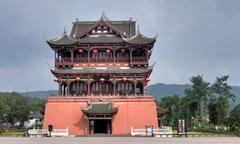Dongjiageng Town Chengdu: Visiting Hours, Tickets, and Attractions Guide
Date: 04/07/2025
Introduction
Dongjiageng Town, nestled within the Chengdu metropolitan area in Sichuan Province, offers travelers an authentic window into the region’s deep-rooted history and vibrant cultural traditions. With its agricultural legacy shaped by the Dujiangyan Irrigation System and its enduring folk customs, Dongjiageng is a living tapestry of rural charm and heritage. This comprehensive guide covers essential visitor information—ranging from historical context and local experiences to practical tips on visiting hours, tickets, and transportation—ensuring you make the most of your journey into Sichuan’s heartland (Chengdu Deep Tour; World of History).
Table of Contents
- Historical Evolution
- Cultural Significance & Local Traditions
- Architectural & Agricultural Heritage
- Socioeconomic Role & Modern Transformation
- Festivals & Community Life
- Culinary Traditions
- Practical Visitor Information (Hours, Tickets, Accessibility)
- Must-See Attractions & Experiences
- Transportation & Accommodation
- Frequently Asked Questions (FAQ)
- Conclusion & Call to Action
- References
Historical Evolution
Dongjiageng Town’s story is interwoven with Chengdu’s own—a city known as the “Land of Abundance” since ancient times. As a satellite of Chengdu, Dongjiageng benefitted from the Dujiangyan Irrigation System, engineered in 256 BCE, which transformed the region into a fertile agricultural zone. During the Han Dynasty, Chengdu’s rise as a silk and trade hub fostered the growth of rural communities like Dongjiageng, supplying food and raw materials to the city (Chengdu Deep Tour; World of History).
Through the Ming and Qing Dynasties, Dongjiageng weathered periods of conflict and prosperity, ultimately emerging as a resilient town that balances tradition with adaptation to modern changes.
Cultural Significance & Local Traditions
Dongjiageng’s vibrant cultural life is reflected in its festivals, culinary heritage, and communal gatherings. The town observes traditional Chinese festivals like the Spring Festival, Lantern Festival, and Dragon Boat Festival, featuring dragon dances, lantern displays, and communal feasts (Adventure Backpack; Ruqin Travel). The Dujiangyan Water-Releasing Festival, though centered in Dujiangyan, resonates locally due to its importance in sustaining agriculture.
Teahouses are central to daily life, hosting Sichuan opera performances and serving as social hubs for storytelling and relaxation (World of History; Forbes Travel Guide).
Architectural & Agricultural Heritage
The townscape is defined by traditional courtyard houses, intricate woodwork, and grey-brick facades. Ancestral halls and temples serve as venues for rites and festivals, embodying family ties and local spirituality. Dongjiageng’s fields and irrigation channels, direct descendants of the Dujiangyan system, highlight the enduring significance of rice cultivation and horticulture (Chengdu Deep Tour).
Socioeconomic Role & Modern Transformation
While rooted in agriculture, Dongjiageng has diversified into rural tourism and small-scale manufacturing. Improved infrastructure connects the town to Chengdu, facilitating both economic integration and the preservation of its rural identity. Local development strives to balance modernization with heritage conservation (Chengdu Discovery).
Festivals & Community Life
The town’s calendar is rich with festivals:
- Spring Festival: Dragon and lion dances, fireworks, and family gatherings.
- Lantern Festival: Lantern displays and folk performances.
- Dragon Boat Festival: Boat races and zongzi-making.
- Peach Blossom Festival (March): Celebrates horticultural beauty and community ties (Ruqin Travel).
These events create opportunities for visitors to engage with local traditions and enjoy the town’s communal spirit.
Culinary Traditions
Dongjiageng’s food culture is a microcosm of Sichuan cuisine. Markets and eateries serve specialties like dan dan noodles, mapo tofu, and chuan chuan xiang (skewers in hotpot). The Chengdu Food and Culture Festival showcases local gastronomy through tastings and cooking demonstrations (Adventure Backpack).
Teahouses offer jasmine and green teas, often accompanied by performances and lively conversation (World of History).
Practical Visitor Information
Visiting Hours
- Town & Public Areas: Generally open from 8:00 AM to 6:00 PM.
- Ancestral Halls/Museums: Usually 9:00 AM to 5:00 PM. Confirm before visiting.
Tickets
- Entry: Most areas are free; some heritage sites charge CNY 20–50.
- Nearby Attractions: Dujiangyan and Mount Qingcheng require tickets (¥60–90).
Accessibility
- Main roads are accessible; some historical sites have uneven ground or steps.
- Accessible restrooms and ramps available at key locations.
Guided Tours
- Local agencies offer history and food tours, often in English and Chinese.
Transportation
- Metro & Buses: Chengdu Metro connects Dongjiageng with city center; city buses and taxis are convenient.
- Bike Rentals: Available near transit hubs.
Photography
- Key photo spots: Ancient streets, tea houses, festivals, agricultural landscapes (especially during the Peach Blossom Festival).
Must-See Attractions & Experiences
Ancient Streets & Courtyards
Stroll stone-paved lanes and explore traditional courtyard houses, many preserved for centuries (Walk with the Dragon).
Ancestral Halls & Temples
Attend or observe rituals and festivals that reveal local beliefs and history.
Tea House Culture
Sample local teas and enjoy Sichuan opera’s “face-changing” art in atmospheric settings (Forbes Travel Guide).
Local Markets & Street Food
Visit bustling markets for fresh produce, spices, and street snacks.
Handicraft Workshops
Participate in classes on Shu embroidery, bamboo weaving, or paper cutting; shop for unique souvenirs.
Nature & Outdoors
Relax in riverside parks and join community activities like tai chi and kite flying.
Day Trips
Explore the Dujiangyan Irrigation System and Mount Qingcheng, both UNESCO sites and easily accessible from Dongjiageng (Asia Odyssey Travel).
Transportation & Accommodation
Getting There
- Air: Arrive via Chengdu Shuangliu or Tianfu International Airports; taxi or public transit to Dongjiageng (40–70 min).
- Rail: High-speed trains to Chengdu; transfer by metro/bus.
- Metro/Bus: Metro lines and city buses connect all major districts.
Where to Stay
- In Town: Local guesthouses and family inns for authentic experiences.
- Central Chengdu: Range of hotels near Chunxi Road and Tianfu Square, with easy metro access.
Getting Around
- Metro: Fast and affordable.
- Taxis/Ride-hailing: Widely available; Didi app supports English.
- On Foot/Bike: Ideal for exploring compact town center.
Frequently Asked Questions (FAQ)
Q: What’s the best time to visit Dongjiageng Town?
A: Spring (March–May) and autumn (September–November) offer mild weather and local festivals.
Q: Are tickets required for Dongjiageng’s main attractions?
A: Most areas are free; some heritage sites and museums charge a small fee.
Q: Is Dongjiageng accessible by metro?
A: Yes, the Chengdu Metro and city buses serve the area.
Q: Are guided tours available?
A: Yes, book through local agencies or online platforms.
Q: Is the town wheelchair-friendly?
A: Main areas are accessible; some older sites may be challenging.
Q: What local dishes should I try?
A: Don’t miss dan dan noodles, mapo tofu, hotpot, and local teas.
Q: Can I buy tickets for other Chengdu historical sites in Dongjiageng?
A: Most tickets are available at the site or online; tour operators can assist.
Conclusion & Call to Action
Dongjiageng Town is a captivating blend of history, culture, and hospitality. Whether you’re exploring ancient streets, joining in on vibrant festivals, or savoring Sichuan cuisine, the town offers a meaningful and memorable experience for every traveler. Plan your visit around local events, make use of Chengdu’s efficient transportation, and consider a guided tour for deeper insights.
For enhanced travel planning, download the Audiala app for real-time updates, itinerary suggestions, and exclusive local tips. Stay connected by following our social media channels and exploring more of our guides to Chengdu’s historical and cultural treasures.
Embark on your journey to Dongjiageng Town and discover the living legacy of Sichuan’s heartland.

